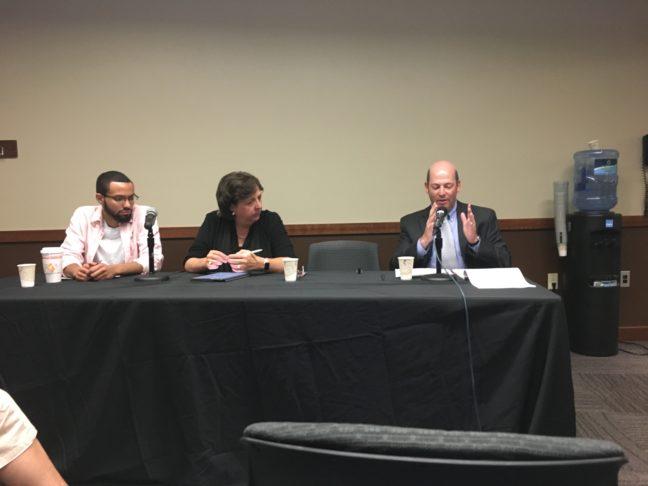Journalism experts hosted a lecture Tuesday in Union South to discuss how the Campus Free Speech Bill relates to the First Amendment.
Some panelists agreed free speech on campus has faced challenges, but others worry bill will disproportionately impact students of color. The Madison Chapter of the Society of Professional Journalists, University of Wiconsin School of Journalism and Mass Communication and UW Center for Journalism Ethics hosted the three panelists.
The panel consisted of Kathleen Culver, assistant professor of journalism and director of the Center for Journalism Ethics, James Burgess, UW student Savion Castro and One Wisconsin Now research assistant, and James Friedman, an attorney representing the Wisconsin Newspaper Association.
The speakers began with discussing their views of the First Amendment and free speech on campus. Specifically, the Campus Free Speech bill proposed by the Wisconsin State Legislature.
The bill, passed in June, intends to protect free speech on UW System schools and allow guest speakers who come to campus to speak without disruption.
Though he took a stance against the bill, Friedman said there is a problem that needed to be addressed when it comes to speech on campus.
“There was a problem that the authors of the bill were directing,” Friedman said. “This was not a solution in search of a problem.”
People should be nervous of restrictions to free speech, Culver said. It is the university’s responsibility to respond, not shut down free speech.
National media outlets often use university incidents of freedom of speech as tools in a culture war, Culver said.
The media plays a role as a representative for the public when it comes to government activities, Friedman said. The media is also a watchdog for the government to keep them in line.
“Free expression is important but we also have to be strategic to understand when we’re being used,” Culver said.
Castro, a student of color, said the legislation would target minority students disproportionately. Students of color are often the ones protesting against white supremacy, Castro said.
Students of color carry a heavier burden because they must fight racial injustice throughout their lives, Castro said. They are fighting for their “right to humanity” when protesting.
“One of the most powerful tools of the civil rights movement was civil disobedience and disruption,” Castro said.
Castro feels as though the country is more divided than it has been since the civil war.
To heal that divide, citizens need to open their views by attending events put on from both sides of the political spectrum, Castro said.
“I think it takes some courage for people to step across the aisle,” Castro said.


